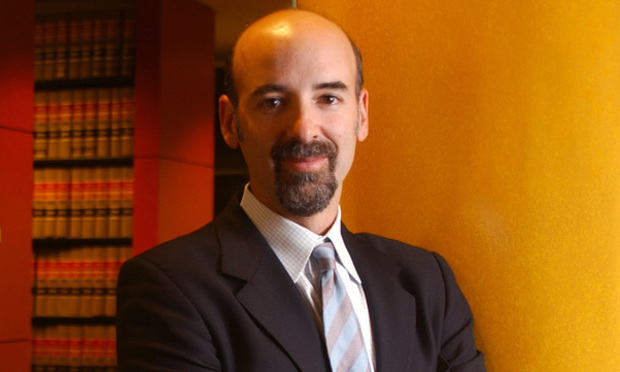Oil Spill Lawyers Win Rare Disaster Class Certification for Coastal Property Owners
A plaintiffs team suing a pipeline operator over a 2015 oil spill off the coast of California scored a rare win when a federal judge granted certification of thousands of property owners. Of course, that success came on the third try.
April 20, 2018 at 06:33 PM
7 minute read

A plaintiffs team suing a pipeline operator over a 2015 oil spill off the coast of California scored a rare win this week when a federal judge granted certification of thousands of property owners.
Of course, that success came on the third try.
In litigation over disasters, whether it's oil spills or wildfires, pursuing a class action on behalf of those with damages to their homes and businesses has been tricky for the plaintiffs bar.
“It is a difficult road to overcome, and it should be,” said Leila Noël, a partner at Santa Barbara, California-based Cappello & Noël, which partnered with San Francisco-based Lieff, Cabraser, Heimann & Bernstein on both the oil spill case and litigation over last year's wildfires in California. But she insisted that it's not cost-efficient for an individual property owner with $30,000 in damages from an oil spill to hire an attorney or experts to pursue her own case. “For a case where it's untenable for a plaintiff to prosecute their case, and defend their rights, that's the purpose of the class action.”
On Tuesday, U.S. District Judge Philip Gutierrez granted certification of a class of property owners with damages from the so-called Refugio spill, caused when a pipeline ruptured, releasing 142,000 gallons of crude oil into the Pacific Ocean and contaminating California beaches and wildlife. In so ruling, Gutierrez looked to a case involving a similar but much bigger disaster: The Deepwater Horizon oil spill in 2010 that ended up costing BP about $65 billion in criminal penalties, governmental fines and class action settlements. Those costs included a 2012 settlement of class actions that businesses filed for economic and property damages tied to the spill. U.S. District Judge Carl Barbier in New Orleans issued class certification rulings in that settlement, some of which BP unsuccessfully appealed to the U.S. Court of Appeals for the Fifth Circuit because they allegedly encompassed businesses with no injuries tied to the oil spill.
Lawyers who have represented victims of California's wildfires insist that judges won't certify classes of property owners in those cases. But Robert Nelson, a partner at Lieff Cabraser, which also was involved in the BP case and has brought class actions on behalf of victims of the recent wildfires, was more optimistic.
“There may be a predilection against certifying property classes because there's some sense out there that property is unique,” Nelson said. “However, we think in these situations, where you had so many properties impacted, that the class mechanism may make sense.”
Henry Weissmann, a partner at Munger, Tolles & Olson in Los Angeles who represents the defendant in the 2015 oil spill case, All American Pipeline, declined to comment for this article.
Plaintiffs brought several class actions against All American Pipeline, a Houston-based pipeline operator, including negligence, public nuisance and other claims. Separately, a trial began on Thursday against All American Pipeline, which faces 15 criminal counts relating to the spill.
After Gutierrez consolidated the cases, plaintiffs moved for certification of four subclasses: Fishermen, oil workers, property owners and tourism businesses that lost money.
In a 2017 order, Gutierrez rejected all but the fishermen subclass.
He found the proposed property owner subclass was “too broadly defined” and expansive, particularly when compared to other oil spill cases.
“Although the Deepwater Horizon oil spill covered more geographic territory than the Santa Barbara spill, the Court in Deepwater Horizon was careful to certify different subclasses of property owners; it did not lump all owners together as Plaintiffs propose to do here.”
Plaintiffs tried again. But this time they dropped the tourism business subclass and renewed their motion to certify a property owner subclass and a “significantly narrowed” oil worker subclass.
They narrowed the property damage subclasses to residents only. There were three groups of people: Those with beachfront properties, those with access through private easements and those within a half mile of the beach. In a Feb. 9 order, Gutierrez approved the oil worker subclass and had no problems with the first two categories of the property damage subclass. But he questioned whether property owners within a half mile of the beach would have similar impacts from the spill.
“It was the half-mile group he expressed concern about,” Noël said. “The order he issued previously on the second go-round was that if there's oil on the beach, if there's oil on the property, and we have a trespass claim, if the property is directly impacted, I see it as a class action. I see the commonality of the claims.”
Gutierrez suggested cutting out the half-mile group, which plaintiffs did in a third certification motion, which he approved this week. The ruling cut out 40,000 potential class members from the property damage subclass, Noël said. But more than 5,000 remain.
“It's a fairly sizable class, but it's a class we could define in such a way we felt like, and the judge felt like, there is a logical and coherent way to distinguish between those properties in the class,” Nelson said.
In particular, they came up with specific categories of property owners based on the amount of oil: Light, medium and heavy.
“These are formal categories of oiling, and we relied on those categories and tried to make the case very clean—that is, only limiting the cases to the properties where beaches are oiled in one of these categories,” Nelson said.
Wildfire Cases
Class certification in the wildfire case could face similar challenges. Cappello & Noël and Lieff Cabraser both have brought class actions on behalf of property owners and businesses with economic damages. Lawyers from both firms are scheduled to address class claims in wildfire and mudslide litigation at a May 8 plaintiffs bar conference in Marina del Rey, California.
On April 16, Ventura County Superior Court Judge Vincent O'Neill, acting as a coordination motions judge, ordered that 36 wildfire and mudslide cases be coordinated in Los Angeles Superior Court.
Not all lawyers representing wildfire victims are convinced a judge will grant certification of a class action.
“The first case I filed was as a class action,” said Alex “Trey” Robertson of Robertson & Associates in Westlake Village, California, who filed the first lawsuit over the recent mudslides. “Then, subsequently, I learned of a second start of the Thomas Fire in Ojai. In light of that evidence, I decided certification was too difficult.”
Gerald Singleton, of Singleton Law Firm in Solana Beach, California, has partnered with Dallas-based Baron & Budd and other firms to file hundreds of cases on behalf of wildfire victims. None is a class action.
“Class actions are great when you have similarities in damages,” he said. “For large numbers of people with small damages here, in fire cases, it doesn't work because you have so many dissimilarities. You might have the ultimate loss, a loved one, a complete home lost, or one whose home survived but was damaged. One might have just smoke damage. You can't lump all those together. The way we do it is we work these cases up individually. Traditionally, that's how these have been done. No class has been certified in a fire case.”
Even Noël acknowledged that her firm has filed some individual cases in the fire and mudslide disasters because their damages are larger—either because they had no insurance or lost millions of dollars. Nelson agreed there's no guarantees, but defended the use of class actions in disaster cases.
“It is not every day that property classes are certified,” he said. “But certainly, this is not the first and won't be the last.”
This content has been archived. It is available through our partners, LexisNexis® and Bloomberg Law.
To view this content, please continue to their sites.
Not a Lexis Subscriber?
Subscribe Now
Not a Bloomberg Law Subscriber?
Subscribe Now
NOT FOR REPRINT
© 2025 ALM Global, LLC, All Rights Reserved. Request academic re-use from www.copyright.com. All other uses, submit a request to [email protected]. For more information visit Asset & Logo Licensing.
You Might Like
View All
Buchalter Hires Longtime Sheppard Mullin Real Estate Partner as Practice Chair

Reality TV Couple and Pacific Palisades Neighbors Sue City of Los Angeles Over Loss of Homes to Fire
3 minute read
In Resolved Lawsuit, Jim Walden Alleged 'Retaliatory' Silencing by X of His Personal Social Media Account
Trending Stories
- 1No Two Wildfires Alike: Lawyers Take Different Legal Strategies in California
- 2Poop-Themed Dog Toy OK as Parody, but Still Tarnished Jack Daniel’s Brand, Court Says
- 3Meet the New President of NY's Association of Trial Court Jurists
- 4Lawyers' Phones Are Ringing: What Should Employers Do If ICE Raids Their Business?
- 5Freshfields Hires Ex-SEC Corporate Finance Director in Silicon Valley
Who Got The Work
J. Brugh Lower of Gibbons has entered an appearance for industrial equipment supplier Devco Corporation in a pending trademark infringement lawsuit. The suit, accusing the defendant of selling knock-off Graco products, was filed Dec. 18 in New Jersey District Court by Rivkin Radler on behalf of Graco Inc. and Graco Minnesota. The case, assigned to U.S. District Judge Zahid N. Quraishi, is 3:24-cv-11294, Graco Inc. et al v. Devco Corporation.
Who Got The Work
Rebecca Maller-Stein and Kent A. Yalowitz of Arnold & Porter Kaye Scholer have entered their appearances for Hanaco Venture Capital and its executives, Lior Prosor and David Frankel, in a pending securities lawsuit. The action, filed on Dec. 24 in New York Southern District Court by Zell, Aron & Co. on behalf of Goldeneye Advisors, accuses the defendants of negligently and fraudulently managing the plaintiff's $1 million investment. The case, assigned to U.S. District Judge Vernon S. Broderick, is 1:24-cv-09918, Goldeneye Advisors, LLC v. Hanaco Venture Capital, Ltd. et al.
Who Got The Work
Attorneys from A&O Shearman has stepped in as defense counsel for Toronto-Dominion Bank and other defendants in a pending securities class action. The suit, filed Dec. 11 in New York Southern District Court by Bleichmar Fonti & Auld, accuses the defendants of concealing the bank's 'pervasive' deficiencies in regards to its compliance with the Bank Secrecy Act and the quality of its anti-money laundering controls. The case, assigned to U.S. District Judge Arun Subramanian, is 1:24-cv-09445, Gonzalez v. The Toronto-Dominion Bank et al.
Who Got The Work
Crown Castle International, a Pennsylvania company providing shared communications infrastructure, has turned to Luke D. Wolf of Gordon Rees Scully Mansukhani to fend off a pending breach-of-contract lawsuit. The court action, filed Nov. 25 in Michigan Eastern District Court by Hooper Hathaway PC on behalf of The Town Residences LLC, accuses Crown Castle of failing to transfer approximately $30,000 in utility payments from T-Mobile in breach of a roof-top lease and assignment agreement. The case, assigned to U.S. District Judge Susan K. Declercq, is 2:24-cv-13131, The Town Residences LLC v. T-Mobile US, Inc. et al.
Who Got The Work
Wilfred P. Coronato and Daniel M. Schwartz of McCarter & English have stepped in as defense counsel to Electrolux Home Products Inc. in a pending product liability lawsuit. The court action, filed Nov. 26 in New York Eastern District Court by Poulos Lopiccolo PC and Nagel Rice LLP on behalf of David Stern, alleges that the defendant's refrigerators’ drawers and shelving repeatedly break and fall apart within months after purchase. The case, assigned to U.S. District Judge Joan M. Azrack, is 2:24-cv-08204, Stern v. Electrolux Home Products, Inc.
Featured Firms
Law Offices of Gary Martin Hays & Associates, P.C.
(470) 294-1674
Law Offices of Mark E. Salomone
(857) 444-6468
Smith & Hassler
(713) 739-1250







